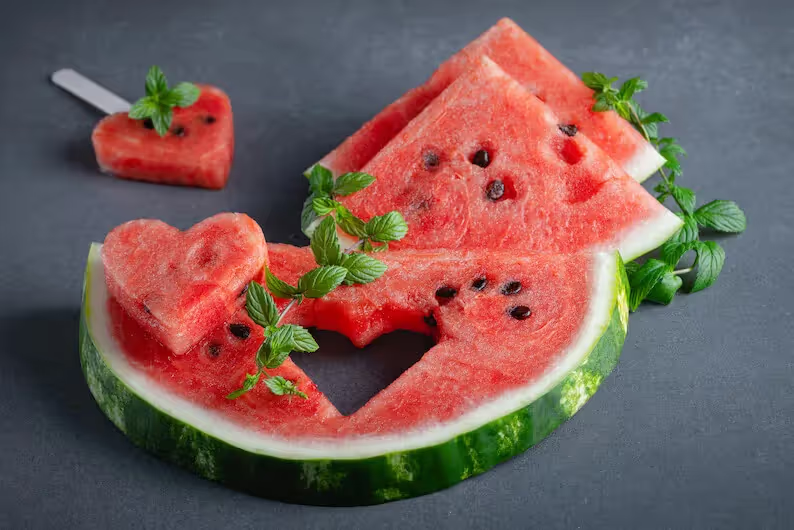Watermelon and summertime just seem to go together. Whether at an outdoor barbecue or lounging on the beach, a nice cold slice of watermelon makes the perfect snack. It's what you would call a summertime staple. But did you know that this juicy, delicious summer treat does more than just satisfy your hunger or desire for something sweet? Watermelon is full of health benefits. And recent studies show that the benefits far exceed satiety and could extend to your heart. That's right. Watermelon is helps with heart health.
A Nutritional Profile That Stands Out
Watermelon is a fruit, and we all know that fruit is a vital part of a healthy diet. But watermelon's combination of nutrients makes it special and stand out from other crowd-pleasing produce.
According to a study published in the journal Nutrients, eating watermelon may help increase total nutrient intake and diet quality. Participants in the study who ate watermelon had a greater intake of essential nutrients, including dietary fiber, magnesium, potassium, vitamin C, and vitamin A, as well as other antioxidants. They also had lower levels of added sugars and saturated fat than non-watermelon eaters.
At just 46.5 calories per cup, watermelon packs quite the nutritional boost for very few calories. One cup of watermelon has the following:
- Calories: 45.6
- Fat: 0.2g
- Cholesterol: 0mg
- Sodium: 1.52mg
- Carbohydrate: 11.5g
- Fiber: 0.6g
- Vitamin C: 12.3mg
- Potassium: 170mg
- Calcium: 10mg
- Vitamin A: 865 IU
- Lycopene: 6,890 micrograms
What are the Health Benefits of Watermelon?
With such an impressive nutritional profile, it's a no-brainer that watermelon offers a host of health benefits. With its abundance of antioxidants, watermelon support disease prevention and overall wellness. Here are some of the many health benefits of watermelon.
It Builds Immunity
Thanks to watermelon's variety of essential vitamins and minerals, your immune system gets a significant kickstart. Watermelon is an excellent source of vitamin C, which plays an integral role in fending off infections by stimulating the activity of white blood cells.
Keeps You Hydrated
As its name suggests, watermelon is made up of roughly 92 percent water. This makes it a great and easy option to hydrate and support your body quickly. Even the slightest bit of dehydration can take a major toll on your body, causing fatigue and muscle cramps. Few adults actually drink enough water, especially during these hot summer days. Watermelon sprinkled with a bit of salt can help replenish your body with lost electrolytes and carbohydrates due to strenuous physical activity or excessive sweating.
Aids in Digestion
Coupled with its high water content, watermelon has a small amount of fiber, both of which are necessary for healthy digestion. The fiber helps to add bulk to your stool, while the water helps to flush waste from your body through your digestive system. In addition, the polyphenols found in watermelon help to create good bacteria in your gut. This is beneficial for digestion and boosting your immune system.
Fights Inflammation
Chronic inflammation is a known precursor to numerous illnesses and diseases. It also causes swelling and pain in those suffering. Watermelon's combination of lycopene and vitamin C has been found to lower inflammation and oxidative stress. This special blend of antioxidants combats free radicals, thus providing anti-inflammatory properties.
Protects the Heart
Research shows that watermelon is emerging as a heart-healthy food that helps lower your heart disease risk. The sweet fruit's heart health benefits can be linked back to the fruit's lycopene content. Lycopene is the nutrient that gives watermelon and other fruits their red and pinkish hues. Along with its anti-inflammatory properties, lycopene has been shown to help improve circulation and decrease plaque buildup in the arteries, contributing to lower blood pressure and a reduced risk of stroke. In addition to lycopene, watermelon contains L-citrulline and L-arginine, two other antioxidants linked to improving arteries and increasing blood flow. On average, watermelon contains 40 percent more lycopene than tomatoes.
Easy Ways to Add Watermelon to Your Diet for Heart Health
It may not be a fruit you think of outside of summer, but it is one you can easily add to your diet to reap its amazing health benefits.
Try adding some watermelon to your water. It will enhance the flavor, and you'll have a little treat to eat at the bottom of the glass.
Snacking on watermelon is a great alternative to chips and other processed junk food. Watermelon makes for a great snack during physical activities. It not only provides you with a snack, but it works to hydrate you as well.
Opt for watermelon as a dessert. Thanks to its high percentage of water, watermelon has a low glycemic load of 5 in a typical portion size of 120 grams. It's delicious, good for you, and will satisfy that sweet tooth craving.
Another great way to sneak watermelon into your diet is to add it to a salad and not just a fruit salad. Watermelon adds a fresh element to leafy greens and a salad with nuts. Drizzle a little balsamic glaze over it, and you'll wonder what took you so long to toss watermelon into your salad mix.
Reap the Benefits, Enjoy the Fruit
Watermelon's health benefits are so fruitful and abundant. Do your health and heart a favor, and enjoy a slice of summer.




